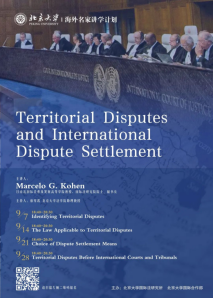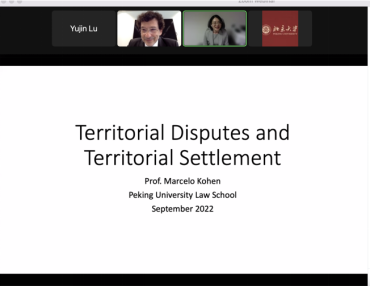Marcelo G. Kohen: Territorial Disputes and International Dispute Settlement
Date:2022-10-05
From September 7, 2022 to September 28, 2022, the Institute of International Law of PKU and the Department of International Cooperation of PKU held a series of online lectures on "Territorial Disputes and International Dispute Settlement". Prof. Marcelo G. Kohen, academician and secretary general of the Academy of International Law, was invited as the lecturer. The lecture series were chaired by Liao Xuexia, assistant professor of PKULS, with the themes of identifying territorial disputes, international law applicable to territorial disputes, choice of methods for dispute settlement, and territorial dispute settlement in the practice of international courts and tribunals.

The core points are presented in the way of text recording.
In the first lecture, "Identifying Territorial Disputes," Prof. Kohen focused on the concept of territory and the diverse status of territories in international law. The second lecture focused on international law applicable to territorial disputes. In the third lecture, Prof. Kohen presented options for dispute settlement. In his final lecture, Prof. Kohen discussed the state motives behind territorial disputes before international courts and arbitral tribunals and the trade-offs between different dispute settlement methods.
After each lecture, Prof. Kohen answered several questions from the audiences. Some Q&A are excerpted as follows:
Question 1:
At present, international law does not clearly define the concept of historic waters, how do you see this concept linking to customary international law, and will this concept have a place in the future development of the law of the sea?
Marcelo G. Kohen:
Indeed, there is currently no clear definition of this concept. If this concept is applied to specific scenarios, many differences may arise between countries. It would be great if there is progress at the normative level. However, it may take a long time to develop more specific rules.
Question 2:
Can the principle of tenure of occupation (Uti Possidetis Juris) also be applied in maritime delimitation?
Marcelo G. Kohen:
In principle, the principle of tenure of occupation could be applied in maritime delimitation. However, when the principle was first invoked by Latin American States, the legal concept of the continental shelf had not yet emerged, making it impossible for newly independent States to inherit the original maritime delimitation. The concept of the continental shelf had existed at the time of the independence of African States, and it would have been possible for African States to apply that principle in maritime delimitation if the African colonizers had established maritime boundaries at that time.
About the Lecturer:
Marcelo G. Kohen, Professor of International Law at the Graduate Institute of International and Development Studies, Geneva; Academician and Secretary-General of the Academy of International Law; served as legal adviser and barrister to governments in proceedings before the International Court of Justice and the International Tribunal for the Law of the Sea; He has been appointed as an arbitrator by the state for many times and is also a member of the list of arbitrators of the United Nations Convention on the Law of the Sea.

Translated by: Xie Junjie
Edited by: Zhou Yaxuan



